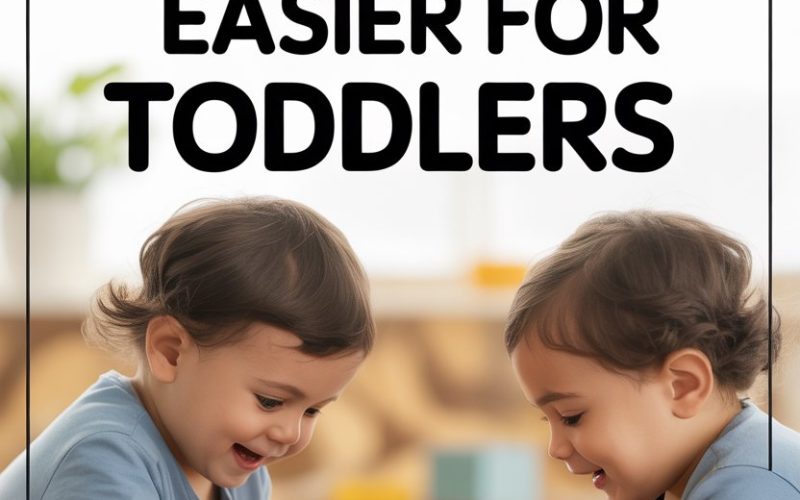Sharing: the holy grail of toddlerhood.
Every parent has been there—one minute your little cherub is playing peacefully, the next, the playroom is ground zero for World War Playdough because someone dared to touch the “wrong” dinosaur.
Turns out, sharing isn’t just hard for toddlers—it’s a full-on developmental milestone. (And frankly, some adults could use a refresher, too.)
If you regularly find yourself refereeing toy tussles, you’re far from alone. Here’s how to help your toddler learn to share, without losing your own marbles in the process.
Sharing Isn’t Instinctive—And That’s Okay
Toddlers aren’t stingy little goblins by nature—they’re just wired differently. Child development experts say that kids under three are especially focused on their own needs and wants.
The part of their brain that handles empathy and impulse control is, let’s say, still under construction.
Expecting a two-year-old to hand over their precious fire truck just because you say “be nice and share” is a little like expecting your cat to bring you a cup of tea. Possible, but highly unlikely.
Instead of seeing refusals as rudeness, recognise them as milestones. Your child isn’t failing at kindness; they’re learning it, one block at a time.
Model Generosity (Even if It’s the Last Biscuit)
Children are tiny, sticky mirrors; they reflect what they see. If you routinely share your snack, your phone charger, or that last biscuit (painful, I know), little eyes are taking notes.
Try narrating your actions: “I’m sharing my apple with you because I love you. Would you like a piece?” Dramatic, yes, but toddlers love drama.
Think of yourself as the star in a never-ending soap opera about generosity.
If you live with other adults or older siblings, enlist them too. Siblings can demonstrate turn-taking, and even your partner can get in on the act.
Nothing says “sharing is cool” like Dad giving up the TV remote without a fuss. (Miracles do happen.)
Practice Turn-Taking—It Counts as Sharing
If you’ve ever tried to get two toddlers to share a toy, you know it’s not just “You have it, now I have it.” It’s a full production involving clocks, timers, and sometimes, tears.
Turn-taking offers a gentler entry point. Instead of saying, “Share your car,” try, “It’s your turn now, and then it will be Jamie’s turn.” Use a visual timer or even a song to mark the end of each turn.
Many parents swear by free apps like the Tots Timer to help keep the peace.
Cheer on your child when they wait patiently—even if their waiting face is more “stormy with a chance of tantrum” than “saintly and serene.”
And if they lose the plot? Well, that’s just another chance to practice patience.
Praise Sharing When You See It (But Don’t Overdo It)
Catch your toddler in the act of sharing, even if it’s just for two seconds—praise it. Quick, specific feedback is powerful. “I saw you give Mia a turn with your blocks. That was kind!”
Not every nice act needs a parade, but consistent, low-key praise lets your child know they’re on the right track.
Be wary of laying it on too thick, though. Toddlers are expert manipulators (future politicians, some of them).
If sharing always nets them a lollipop or a ticker-tape parade, motivation can quickly shift from kindness to “What’s in it for me?”
Offer Language for Sharing and Feelings
Many battles erupt because toddlers don’t have the words to say, “I was playing with that first!” or “I’m not ready to give this up yet!”
Teaching phrases like “My turn, please,” “Can I have a turn next?” and “Can we play together?” gives kids tools to negotiate tiny treaties.
Books are your secret weapon here. Stories like “Llama Llama Time to Share” or “Sharing Time” gently reinforce both the emotions and words toddlers need for sharing.
If emotions run high, help them label their feelings: “You feel upset because you wanted the truck. It’s okay to feel sad. We can wait for your turn.”
Even if your toddler is mid-meltdown, your calm words plant seeds for future sharing.
Don’t Force Sharing in the Heat of the Moment
The phrase “You need to share!” can backfire, especially if your toddler is deep in play. Forcing a handover often leads to resentment, not generosity.
Toddlers can see forced sharing as a punishment, making them more possessive next time.
Try giving a gentle warning: “You’re playing with the puzzle now. When you’re finished, Max would like a turn.”
This respects their need to feel secure with their things, while also teaching them that others matter.
Some experts suggest reserving a few “special” toys at playdates—items your child doesn’t have to share. This helps them feel in control and less anxious about losing everything to the neighbourhood toy vultures.
Set Up Opportunities to Practice (But Don’t Expect Miracles)
Playdates, nursery, and even trips to the park are arenas for social learning. Kids need repeated, low-stakes opportunities to try sharing, fail, and try again.
Structured games that require turn-taking—think simple board games, building towers together, or rolling a ball back and forth—offer practice without the high drama. (No, you can’t put the family silver up for grabs on Monopoly. Nice try.)
Lower your expectations. One shared crayon, one unbroken session of Duplo—these are small victories. Celebrate them.
Stay Close, but Don’t Swoop In (Too Quickly)
Your toddler is much more likely to share (or at least not body-slam another child) if they know you’re nearby. Stay close to supervise, but try to let them work things out with a little coaching from the sidelines.
If tensions escalate, step in calmly. Narrate what you see: “You both want the dump truck. It’s hard to wait.” Offer solutions, not blame: “What should we do? Take turns? Find another truck?”
Children often need help seeing options in the heat of the moment.
But resist the urge to referee every minor squabble. Sometimes, kids are sorting things out on their own—a valuable skill in itself.
Use Empathy (Even When You Want to Scream)
It’s tempting to dismiss your toddler’s distress over toy disputes. But those big, blubbery tears are real to them. Show empathy: “It’s hard to share sometimes. You really love that toy.”
Research shows that when children feel understood, they’re more open to compromise and less likely to dig in their heels.
Plus, you’re modelling the kind of emotional intelligence you’d love to see in your child someday. (Yes, even when they’re 16 and hogging the bathroom.)
Avoid Shaming or Comparing
No one likes to hear they’re “bad at sharing,” especially from the person who cuts their grapes in half. Avoid phrases like “Why can’t you be nice like your sister?” or “You’re being selfish.”
Shaming only breeds anxiety and sibling rivalry.
Instead, focus on positive behaviours: “You gave your friend a turn, that was thoughtful.” Keep it about the action, not the child’s worth.
Give it Time (and Then Some)
Patience, dear parent. Sharing is a skill that unfolds over months and years, not days.
Research from Harvard’s Center on the Developing Child shows that self-control and empathy continue developing well into the preschool years.
You might feel like you’re stuck in a loop—same playdate, same squabble, same sticky hands—but these small moments matter. Consistent guidance, lots of practice, and a smidge of perspective go a long way.
The Odd Exception: When Not to Encourage Sharing
Certain situations call for a break from sharing. If your child is exhausted, hungry, or overwhelmed, pressing for generosity is a lost cause. Some toys genuinely are precious treasures—think security blankets or a beloved stuffed animal.
These don’t need to be up for grabs.
Respecting your child’s boundaries makes sharing feel safer, not scarier.
A Word on Cultural Differences
Not every family or culture approaches sharing in the same way. Some communities prize communal play and encourage open sharing from an early age. Others emphasise respect for personal property.
If you’re co-parenting across cultures or have a diverse friend circle, talk openly with other adults. Mixed messages can muddle things for little ones.
You’re Not Raising a Tiny Tyrant—You’re Raising a Human
If you’ve made it this far without chucking a toy out the window, you’re already doing brilliantly. Teaching toddlers to share is less about lectures and more about repetition, patience, and managing expectations.
Your job isn’t to raise a perfect sharer—it’s to nurture a child who can balance their needs with those of others, who can say “my turn” and “your turn,” and who (occasionally) gives up the red car without a wrestling match.
And if all else fails? Share the chocolate biscuits with yourself. You’ve earned them.




